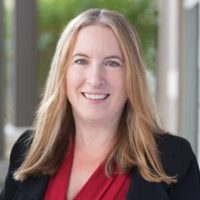
Deborah Brady,
SVP & CFO,
Key Equipment Finance
Life today is beginning to resemble normalcy. But before we rapidly go back to what was, it’s important to take stock of what we’ve learned over the last 16 months and use the knowledge we’ve gained to guide us as we map out future plans. To get a glimpse of this process in action, we sat down with three leaders in different roles — communications, operations and a CFO — to hear about their biggest challenges, the lessons they’ve learned and how they are creating a new normal.
True connection with others — including colleagues, customers or the general public — requires authenticity. As his team made the quick shift to remote work and the U.S. experienced a tumultuous election year layered with highly charged events related to violence against marginalized communities, Matt Hurwitz, executive vice president and head of commercial banking communications at Wells Fargo, learned this lesson firsthand.

Hurwitz says the last year and a half has been incredibly hard on people emotionally and mentally. Under these conditions, creativity in the workplace has become essential as has taking care of his team and making sure they have the space to adapt to their unique experiences.
For Hurwitz, sending out memes from “Schitt’s Creek” to celebrate birthdays and work anniversaries became a frequently used communication tool that helped keep people laughing and feeling connected.
“We found ways to get closer, and we found ways to just bond a little bit more,” Hurwitz says, noting that his team’s strong relationships with the commercial banking team helped them withstand the “unpredictable nature” of 2020.
Hurwitz says 2020 delivered a welcome change, as the pace of diversity, equity and

inclusion journeys accelerated around the globe. “We have spent more time saying, ‘Are we being inclusive as we can be? Are all voices at the table?’” Hurwitz says.
In June 2021, Hurwitz’s team chose to celebrate Pride Month and found ways to elevate other communities that rarely get the spotlight.
“We were supported across the board by our business leaders,” Hurwitz says. “The most senior people in our commercial banking organization were also posting, and they were working with us and saying, ‘What can I do? How can our voice be a part of positive change?’”
Hurwitz stresses the importance of allyship as marginalized communities continue to speak up and lead the change. “Whether you are an ally to me as a member of the LGBTQ community, or me being an ally to our Black and African-American communities and friends or speaking out against violence that the Asian American Pacific Islander communities were experiencing, allyship is critical,” he says.
Along with many other companies, Wells Fargo has adopted DE&I goals. “The hope is to have our leadership and our teams reflect the diversity of the communities that we support,” he says.
Hurwitz encourages other equipment finance companies to be brave when it comes to expressing allyship publicly. He says creating authentic communications requires having input from the representatives of certain communities.
“Have the courage to ask questions and have conversations,” Hurwitz says. “Challenge yourself to ask questions that make you a little uncomfortable.”
Overall, Hurwitz believes that the art of persuasion has not changed. He believes there is no substitute for a good idea, compelling content and strong relationships. He hopes we all look inward, keep what worked in the past and build a new future. “This is a really good chance for us to be innovative,” Hurwitz says.
Choosing an Entrepreneurial Mindset of Gratitude
The equipment finance industry is a tight-knit community, and when the COVID-19 pandemic struck, Jaimie Haver, president of Happy Manufacturing, says the people of the industry proved the strength of their bonds.
“We may be competitors, but we’re also friends and we’re in it together,” Haver says. “I really saw a lot of win-win amongst the companies in this industry. If we’re all helping our customers, then we’re all going to win in the end.”
When the first effects of the COVID-19 pandemic developed in 2020, Haver — who worked for a Monitor 100 bank at the time — found that fellow operations professionals were forthcoming about their processes, fees, charges and documentation. “They were so open to helping and making sure that we were all doing it the same way so our industry had a level of consistency,” Haver says.
Ensuring you are doing business with people who share your core values was another important lesson for Haver, who notes this will make a “huge difference” when it comes to collections.
Speaking of collections, Haver has witnessed a great deal of mutual compassion and empathy in this part of the industry during the pandemic. When her team spoke with customers in dire situations and extended kindness to them, customers radiated that kindness back. “It made the collections process even better and more meaningful because you knew you were making a difference,” she says.
Haver believes that people will give you their best when you acknowledge them and express gratitude for their impact. “Reminding people of the importance of their contributions constantly is huge because people aren’t automatically always super self-motivated,” Haver says. “But when they’re appreciated, it’s a lot easier to be motivated. When you consciously make a choice to be thankful, you can also consciously choose to be happy.”
When professionals become frustrated with colleagues, Haver suggests taking a step back, viewing the situation through the lens of personal responsibility and finding a way to be thankful.
Similarly, if a professional discovers a flaw in an existing process, Haver believes they should bring it to their team’s attention and deliver a recommended solution. “I don’t really support people bringing problems without bringing solutions because I think everybody on a team should be a leader with an entrepreneurial mindset, regardless of the role that they’re in,” she says.
Haver believes the entrepreneurial mindset will be essential to the operations role — and every role in equipment finance — in the future. To further prepare to succeed in the “new normal,” she also suggests cross-training teams in sales, credit, documentation and funding. Not only is this approach good for a business and emergency situations, Haver says walking in the shoes of other departments may also ease frustrations and create new solutions.
“It’s really easy to be critical of somebody when you don’t know what the heck they do,” Haver says. “The days of siloed working should be over.”
Thinking Strategically
If you created a word cloud of the most common phrases we’ve heard over the last 16 months, “essential” would be huge. While most conversations during the COVID-19 pandemic focused on essential employees, Deborah Brady, senior vice president and CFO of Key Equipment Finance, says the experience also demonstrated just how essential the equipment finance industry really is.
“Equipment leasing and financing is critical to our clients’ business needs,” Brady says, adding that the industry experienced “relatively low default rates” throughout the pandemic. “That showed us that the services provided to our clients were essential and needed because they were continuing to lease our equipment and continuing to use our services.”
The resiliency of clients was another major takeaway for Brady. “Our clients’ businesses have endured during the pandemic, and by reinventing themselves and rebuilding, they are supporting a strong economic outlook for the second half of 2021,” Brady says.
Rapid Adaptation
Similarly, Brady has marveled at equipment finance’s ability to adapt: “The industry has done an excellent job adjusting to the work environment and adapting to transacting business digitally.”
Brady knows firsthand how much of a challenge it can be to keep a team connected and motivated while they are working from home.
“Remote work is definitely less conducive to relationship building, so I found it a bit of a challenge to make sure that I was connecting with co-workers,” Brady says.
To overcome this challenge, Brady would often call a colleague instead of simply replying to an email, or she would go on camera to provide more opportunities for face-to-face interaction.
“I try to build that connection with teammates with more check-ins, more scheduled meetings than we would normally have in person, just to make sure that we’re collaborating,” Brady says.
The Strategic CFO
Digital transformation has enabled remote work to take hold, and over the course of her career, Brady has watched this phenomenon transform the CFO role as well. “The availability of enhanced tools and digital technology have allowed companies to improve processes and access real-time data,” Brady says, noting that CFOs are able to spend less time on compliance and reporting activities and more time on business insights and analytics.
“Over the last 18 months, there has been even more of a push for digital solutions due to the heightened productivity associated with remote work,” Brady says.
As digitalization accelerates, Brady believes the CFO role will continue to shift. “It will be important that the CFO is a strategic thinker and strategic partner to the business,” Brady says. “The CFO of the future will need to adopt a broad experience and business knowledge so they can provide that strategic value.”
Rita E. Garwood is editor in chief of Monitor.
No categories available
No tags available